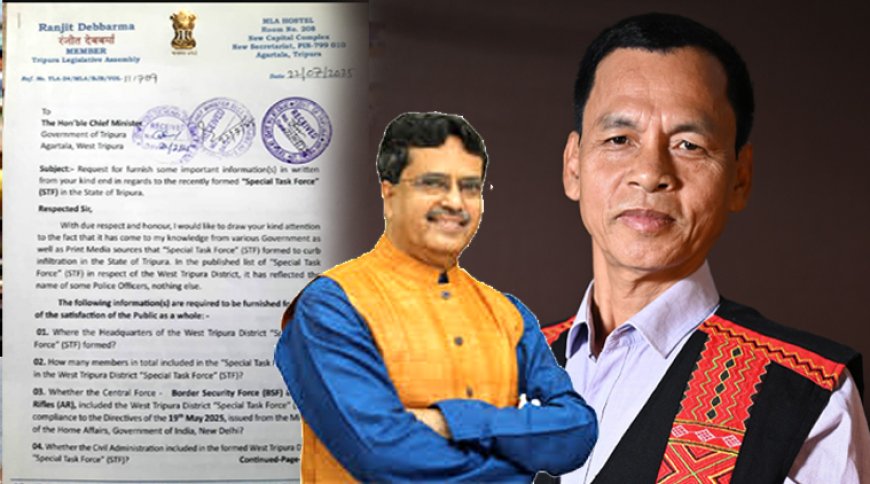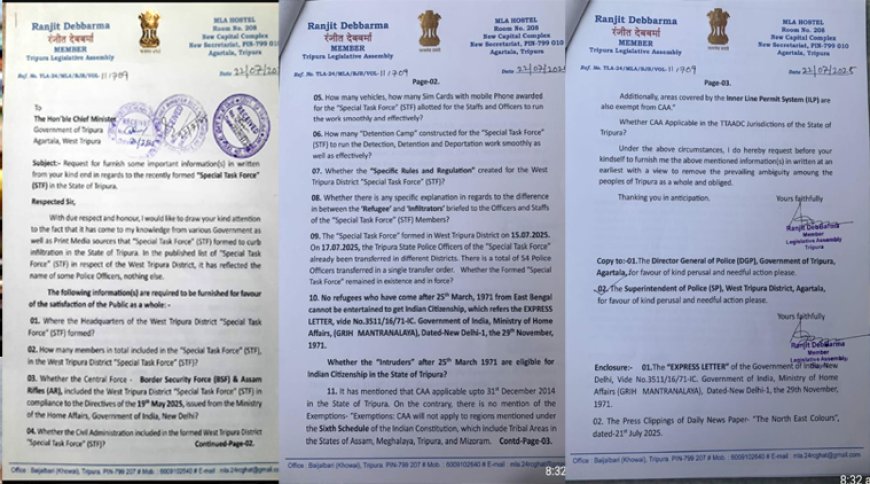"The Tiger MLA" Ranjit Debbarma Raises Alarm Over Infiltration: Demands Transparency on Special Task Force Operations in Tripura
Tripura MLA Ranjit Debbarma has written a strong letter to Chief Minister Dr. Manik Saha, raising 11 urgent questions regarding the formation and functioning of the newly announced Special Task Force (STF) meant to curb illegal infiltration in the state. Debbarma expressed serious concerns about the lack of transparency, absence of proper structure, and sudden transfer of officers, which he believes is weakening the STF's effectiveness. He demanded clarity on: STF’s structure, headquarters, and personnel Inclusion of central forces (BSF, AR) and civil administration Operational resources and detention infrastructure Rules distinguishing refugees from infiltrators Applicability of CAA in TTAADC tribal areas Debbarma’s letter signals growing mistrust between the indigenous community and the state government, and warns that Tripuris’ identity and future are at risk if the infiltration issue is not addressed with sincerity and transparency.
In a bold move that underscores rising concerns among indigenous communities, MLA Ranjit Debbarma, often hailed as "The Tiger MLA", has written a detailed letter to Chief Minister Dr. Manik Saha, demanding urgent written clarification on the structure, functioning, and legitimacy of the Special Task Force (STF) formed to combat illegal infiltration in Tripura.
In his 11-point letter, Debbarma outlines critical questions that, according to him, must be answered to maintain public trust and protect the rights and future of the indigenous Tripuri people. He also sends copies of the letter to the DGP and SP of West Tripura District, indicating the seriousness of the matter.
Key Questions Raised by Ranjit Debbarma:
-
Where is the STF Headquarters? — No clear information is available about its base of operations in West Tripura.
-
How many members are in the STF? — The government has not disclosed this basic data.
-
Are central forces like BSF & Assam Rifles involved? — There's no clarity despite directives from the Ministry of Home Affairs.
-
Is the civil administration part of the STF?
-
What resources (vehicles, mobile phones, SIM cards) are allotted to the STF?
-
How many detention camps have been built?
-
Are there specific rules and regulations guiding STF operations?
-
Is there a clear briefing on the difference between ‘refugees’ and ‘infiltrators’?
-
Why were 54 STF officers transferred just 2 days after its formation? — This sudden move raises doubts about the task force’s continuity.
-
Are infiltrators after 25th March 1971 eligible for citizenship? — Referencing a 1971 Home Ministry letter, Debbarma demands a clear policy stance.
-
Is the CAA applicable in TTAADC areas? — As per constitutional exemptions under the Sixth Schedule, the MLA questions CAA's legal applicability.
"People of Tripura Deserve Answers": Debbarma
Ranjit Debbarma emphasized that Tripura’s tribal population, already marginalized by decades of demographic changes, must not face further insecurity due to governmental opacity. He stressed that illegal infiltration poses a threat to the very existence of the Tripuri people, and ambiguity around the STF only worsens public trust.
He also strongly implied that both state and central authorities have failed to provide transparent and proactive measures, prompting him to formally demand answers.
Political Undertone: Growing Mistrust
Observers note that this letter is more than an administrative query—it’s a clear expression of mistrust towards the state government. The reference to the transfer of STF officers just 48 hours after formation of the task force may indicate either bureaucratic dysfunction or deliberate dilution of STF's purpose.
Implications for Tripura and the Northeast
This development is crucial for Tripura, especially within the TTAADC areas, where Sixth Schedule protections are constitutionally guaranteed. Debbarma’s reminder that CAA does not apply to these regions further complicates the already sensitive issue of illegal immigration and indigenous identity.
By Choba Tripura


